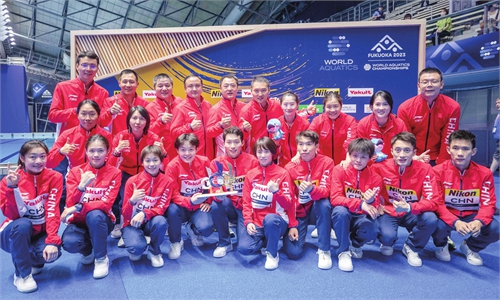
Illustration: Liu Xiangya/Global Times
Soccer-related corruption topics trended social media, as a trailer from a high-profile anti-corruption documentary released on Friday that involves former deputy director of the General Administration of Sport Du Zhaocai, former Chinese Football Association (CFA) president Chen Xuyuan and former national team head coach Li Tie has sent the topic to the top of social media discussions.The Chinese national soccer team, who are in Doha in preparation for the upcoming Asian Cup in Qatar, will collectively watch the documentary amid their intense training schedule, according to media reports. Such cautionary education holds significant value and meaning as it allows all national team players as well as officials to genuinely recognize the responsibilities and burdens on their shoulders and acknowledge the importance of the issue for years.
Li, once brimming with pride when appointed as the head coach of the national team in January 2020, has now publicly expressed regret, admitting that he should have taken a more grounded and ethical path. Chen, who had criticized the excessive spending in Chinese soccer during his tenure, ultimately found himself entangled in corruption. Their fall from grace serves as a cautionary tale for the soccer community, prompting introspection on the sport.
As a major team ball game, soccer has profound influence in China. The national team's single entry to the 2002 FIFA World Cup once sent the country into wild jubilation. Even though the team has experienced over two decades of underachievement, what happened to them has often been put under scrutiny.
The anti-corruption determination was striking, extending beyond the aforementioned trio to involve 11 other high-ranking soccer officials. The scandals in soccer have not only tarnished their legacies but have also cast a long shadow over the development of the sport in the country.
It should also be mentioned that from Shandong Taishan's former head coach Hao Wei to players like Jin Jingdao, Guo Tianyu and South Korean player Son Jun-ho, the current reach of the investigations has spared no one. Even Xu Jiayin and Liu Yongzhuo, former executives of eight-time Chinese Super League champions Guangzhou Evergrande - known for their high-rolling spending on players' salaries and transfers - have now been put under probes.
The soccer industry in China, which witnessed a similar high-profile anti-corruption campaign a decade ago, faces the harsh reality. The "golden era" of Chinese soccer failed to capitalize on its potential for growth, instead being seeped into by corruption and embezzlement.
While current CFA President Song Kai, who took charge in October 2023, emphasizes the importance of youth training, the efficacy of these efforts may be compromised if anti-corruption measures are not comprehensively implemented.
To achieve lasting change, it is imperative to shift the focus from merely punishing the guilty individuals to implementing systemic and institutionalized anti-corruption measures. This approach would not only address the current crisis but also fortify Chinese soccer against future corruption threats.
Systemic change involves a multifaceted approach that encompasses legal reforms, increased transparency, and a cultural shift within the soccer community. The establishment of a robust regulatory framework is crucial to preventing corruption from taking root again. This framework should include stringent financial oversight, mandatory reporting mechanisms, and thorough background checks for individuals assuming key roles within soccer organizations.
Transparency is another cornerstone of systemic change. Soccer clubs, associations, and governing bodies must commit to open communication and disclose financial transactions, player transfers, and sponsorship deals. Creating a culture of accountability will require a paradigm shift, encouraging stakeholders to prioritize the long-term health of Chinese soccer over short-term gains. Cultural change within the soccer community is perhaps the most challenging but indispensable aspect of this transformation. Instilling values of integrity, sportsmanship, and fair play from grassroots levels to professional ranks will reshape the mind-set of players, coaches and administrators. The focus should shift from the pursuit of immediate success at any cost to nurturing a sustainable and ethical soccer ecosystem.
The scandals have undoubtedly stained the reputation of Chinese soccer. Rebuilding trust and confidence requires a concerted effort to demonstrate that the sport is free from corruption and manipulation. The journey toward redemption begins with sincere apologies from those implicated, followed by concrete actions to rectify wrongs.
The current difficulties in Chinese soccer present a pivotal moment for change. To ensure a lasting impact, authorities must go beyond mere punitive measures and focus on building a soccer ecosystem that is resilient to corruption. The success of these efforts will determine the future of Chinese soccer.
The author is a reporter with the Global Times. life@globaltimes.com.cn

